10 Best Rangefinders for Bow Hunting in 2025 – Top Picks & Guide
Last Updated on
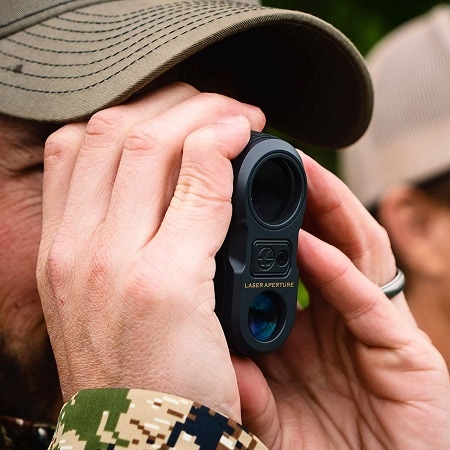
A good rangefinder can undoubtedly improve your bowhunting experience, but when there are so many models available, you might find it challenging to know where to begin. Along with archery, you can find rangefinders for golf, rifle hunting, and other specialties. Knowing which features you need in your rangefinder is critical to choosing the best one.
We’ve reviewed dozens of rangefinders for every purpose and have chosen 10 that we feel are great bow hunting rangefinders worth your time. We’ve also included a buyer’s guide where we break down the different features a bow hunting rangefinder needs, so you know what to look for when shopping around.
Keep reading for our detailed reviews, where we compare range, zoom, angle calculation, and durability to help you make an educated purchase that makes you feel good about your next purchase.
Let’s look at the different models we chose to review.

A Look at The Winners in 2025
| Image | Product | Details | ||
|---|---|---|---|---|
| Best Overall |
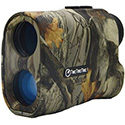 |
TecTecTec |
|
CHECK PRICE |
| Best Value |
 |
Halo XL450 |
|
CHECK PRICE |
| Premium Choice |
 |
Leupold TBR |
|
CHECK PRICE |
 |
Bushnell 202208 |
|
CHECK PRICE | |
 |
Nikon 16224 |
|
CHECK PRICE |
The 10 Best Rangefinders for Bow Hunting
1. TecTecTec Hunting Rangefinder – Best Overall

The TecTecTec ProWild Hunting Rangefinder is our choice for best overall, and we feel it’s one of the best archery rangefinders you can buy. It packs in a lot of features while keeping the cost reasonable. It features a 540-yard range, which isn’t that long, but in our experience, most of that range is very accurate, whereas many other models start to suffer performance issues at the halfway point. The through-the-lens display is one of the easiest to read of all the rangefinders we’ve reviewed. The continuous scan feature makes it easy to survey an area and select a target, and it can detect an object as close as 4-yards away.
We do wish it had angle calculation and back target selection.
- Very accurate
- 540-yard range
- Easy read display
- No angle calculation
- No back-target mode
2. Halo XL450 Range Finder – Best Value
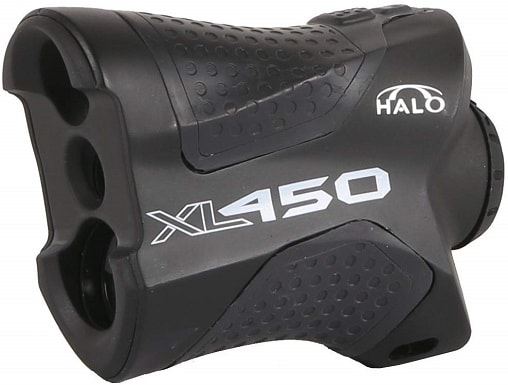
The Halo XL450 Range Finder is our pick for best value. It has all the essential requirements and keeps the cost down. We think you will agree that this is the best bow hunting rangefinder for the money. It features a 450-yard range with a powerful 6x zoom. We were able to see all targets easily within range. The powerful class-three laser helps power through haze and rain and means better accuracy even in bad weather. Angle calculation is helpful and can improve your shot.
The only trouble we had was selecting targets when there were a lot of other objects around, and this unit would benefit from the ability to select back objects. It’s short range keeps it out of the top spot, and it has a strange shape that’s hard to fit in your pocket.
- Low cost
- 6x zoom
- No back-object selection mode
- Strange shape
3. Leupold TBR Laser Rangefinder – Premium Choice

The Leupold RX-1600i TBR Laser Rangefinder is our premium choice. This rangefinder is for those that require a high-powered rangefinder and aren’t afraid to pay a little extra to get the features they need. This rangefinder is 100% waterproof, and the lens won’t fog up like happens with so many other models. It can range reflective targets to 1600 yards, and targets are easy to see with the 17.5-mm eye relief, 6x zoom, and bright red OLED display. The continuous mode scan helps you track targets as they move across the field, and the angle calculations improve your confidence and your shot.
The high cost keeps it from ranking higher on our list, as does the lack of back target priority.
- 1600-yard range
- Angle Calculation
- 6x Zoom
- High Cost
- No back-target priority
4. Bushnell 202208 Laser Rangefinder

The Bushnell 202208 Bone Collector is a rangefinder with a great name and some useful features. We liked the bright display offered by this model. The high definition viewscreen is easy to see in the dark and includes a battery gauge, so you are always aware of battery life. The 4x magnification is adequate, and the unit feels very durable.
We don’t like the lack of angle calculation. The maximum range is too short, and the minimum is a little too far. On the other hand, it is waterproof.
- Bright display
- Waterproof
- Durable housing
- No angle calculation
- Short-range
- Can’t read close objects
5. Nikon 16224 Bowhunting Laser Rangefinder
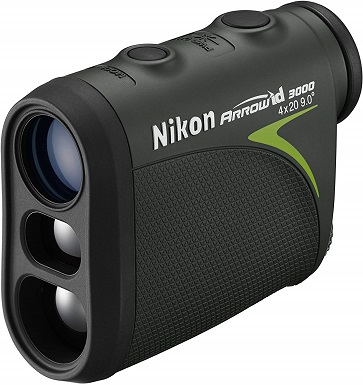
The Nikon Arrow offers the bow hunter some nice advantages in the field. It features angle calculation, capable of detecting the angle and displaying the horizontal distance to the target. It also features dual targeting, allowing you to choose between front and back targets. We enjoyed the eight-second continuous scan feature that will enable you to survey a landscape checking the distance of multiple targets. The 20.3 mm eye relief makes the screen easy to see and use.
We don’t like the low-powered laser. It doesn’t work well in high humidity and is responsible for the relatively short range of 550 yards. We feel the price tag is a little high for the provided range.
- Angle calculation
- Front and back target selection
- Eight-second continuous scan
- Weak laser
- Short-range
- Expensive
6. Wosports 07 Hunting Range Finder

The Wosports 07 Hunting Range Finder is a good all-around archery rangefinder, but it lacks most of the essential features required to be an excellent bow hunting tool. It features a compact design that’s noticeably smaller than many other models. It’s water-resistant, lightweight, and easily handled. It has a large eyepiece and can detect the distance of an object to 650 yards. The 6x magnification is a nice bonus, and speed detection is useful on occasion.
We didn’t like the lack of angle calculation of any kind. There is no way to select between front and back targets, and the display is hard to read at times.
- 6x Magnification
- Water resistant
- Compact design
- No angle calculation
- No back-target selection
- Hard to read display
7. SIG Sauer Laser Rangefinder
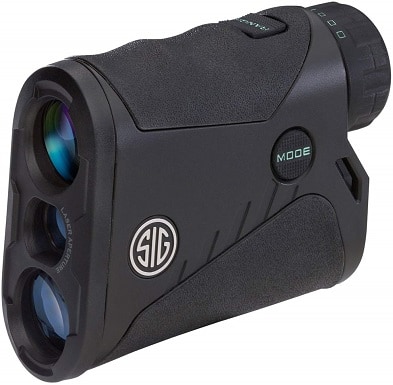
The SIG Sauer Rangefinder is a powerful little unit with many of the coveted features. It has one of the longest ranges available and can detect objects up to 1200 yards away. It uses a DSP engine capable of updating the range four times per second and is one of the most accurate we’ve tried. You can also select different targeting modes, including last, first, and best, and it also has angle calculation.
We didn’t like the LCD viewscreen. It has a black background and is difficult to see in low light. We also felt the 4x magnification is small for a device with a 1200-yard range.
- Very long range
- Angle calculation
- DSP engine
- Poor viewscreen
- Low magnification
8. AOFAR Hunting Laser Rangefinder
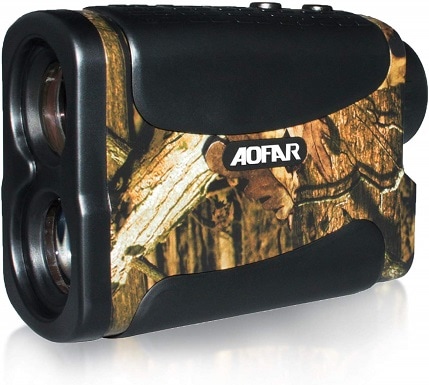
The AOFAR AF-700L Hunting Laser Rangefinder can detect the distance of an object up to 700 yards away. It features a fog mode to help get accurate readings in bad weather. We liked the durable, waterproof design that this model features, and it’s lightweight.
The fog mode is helpful, but it’s not a substitute for far target selection, which this model doesn’t have. The viewscreen is slightly dim and hard to read in low light. There’s also no angle calculation included in this model.
- Fog mode
- Waterproof
- Dim viewscreen
- No angle calculation
9. Gogogo 6X Hunting Laser Rangefinder
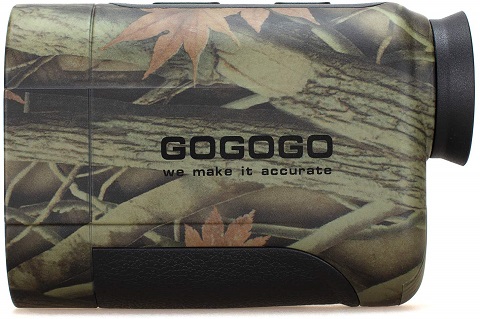
The Gogogo 6X Hunting Rangefinder can give you the distance of an object up to 1200 yards away and equips you with 6x magnification. It features speed and angle detection. We liked the free carrying bag and the microfiber cleaning cloth.
We didn’t like the laser in this model because it didn’t work very well in any conditions other than a calm sunny day. Wind, rain, and fog all seemed to degrade performance. There is also no back-target lock, and though there is angle calculation, it’s limited to the smaller angles more commonly seen in golf.
- 1200-yard range
- 6x magnification
- Weak laser
- No back-target priority
- Limited angle calculation
10. BIJIA 650Yards Hunting Rangefinder

The BIJIA 650Yards Hunting Rangefinder is the last rangefinder on our list, and though it is not in the same league as our first three picks, you might find it has some redeeming qualities that appeal to you. This rangefinder detects objects out to 650 yards. It features continuous scan, slope correction and can measure the speed of your target.
We thought the 650-yard max distance was a little low, and we had some trouble seeing our target in low light through the viewscreen. There is no back-target priority, and the small-angle calculation is better suited to golf than bow hunting. Finally, the hard-plastic case made the rangefinder slippery at times.
- Continuous scan
- Speed detection
- Low maximum distance
- Poor visibility through the viewscreen
- No back-target priority
- Slippery plastic case

Buyer’s Guide: Picking the Best Rangefinder for Bow Hunting
Let’s learn what to look for in a rangefinder. We’ll start with the features that will be most helpful to a bow hunter.
Angle Calculation
One of the most important features that a range finder can offer an archer is the ability to calculate angles. There are two parts to calculating angles.
- First, it needs to tell you what the angle is. Is your target on level ground, or is it at a 50-degree angle?
- Next, it needs to make calculations based on the distance and angle of the target. Shooting a target at 25 yards on level ground is one thing but shooting a target at 25 yards that is at a 45-degree angle above you is going to be a much further shot. Owning a device that can tell you precisely what the distance is with the angle calculated, which will make a significant difference on the hunt, especially when hunting from a tree stand.
Range
Since we’re talking about bow hunting, it seems like a 1000-yard or more rangefinder might be more distance than we need. However, rangefinders don’t work very well at their maximum range. A general rule of thumb is to select an archery range finder with double the range you need. A 1000-yard rangefinder will do a better job with an object at 300 yards than a rangefinder rated for 500 yards will do.
Far Target Priority
Target priority is how your rangefinder determines what to focus on when there are multiple objects in the view screen. First priority is when you want the closest target, usually used in golf where the trees are generally behind your target. Last priority focuses on the most distant target, perfect for hunting where the target is often behind the trees. Some rangefinders allow you to cycle through targets, but this feature might not be helpful in bow hunting, where every second makes a difference.
Close Target Sensitivity
Bowhunters are going to need their archery range finder to be able to read close targets. You should be able to lock on to targets within 10 yards, and at that close distance, the unit’s ability to give the range in fractions of a yard will also be helpful.
Magnification
We need to be able to zoom in on our target, but as bow hunters, our target is usually not very far away. Too much zoom can cause you to become disoriented and waste valuable seconds as you gain focus. A 5x or 6x zoom should be more than adequate for most situations allowing you to get a good look at your target without becoming disorienting.
More on trail cameras:
- Is $200 the right price for a rangefinder?
- Are Browning trail cameras worth it?
- A closer look at wireless trail cameras
Viewscreen
The viewscreen is one of the most critical aspects of the rangefinder. You need to read the information presented to you without struggle, even in the low light situations often present while hunting. Eye relief is another important component of the viewscreen. Usually measured in millimeters, eye relief states how far the eye needs to be from an eyepiece to see the whole image. The bigger the distance, the easier it will be to use the rangefinder.
Water Resistance
You cannot overlook your rangefinder’s ability to prevent water from shorting out its sensitive electronics. A waterproof, or at the very least water-resistant rangefinder, is essential. Weather is seldom perfect, and there’s also dew and puddles to consider.
Durability
On par with water resistance, your hunting rangefinder is likely to see some abuse. It will undoubtedly get banged around a lot more than a golf rangefinder might. Always look at the craftsmanship and the quality of materials used in the construction to ensure you’re getting something that can handle the dangers of the hunt.
Other Features
There are plenty of other features a rangefinder can offer, like speed detection and the ability to compensate for fog and haze. These features might not have a significant impact on your bow hunting results, but they might make the unit a more worthwhile investment by being useful during the offseason.
Rangefinder Tips
- Learn to use the rangefinder properly
- Practice using your rangefinder as you would practice shooting
- Keep in the case when not in use
- Learn your rangefinders strengths and weaknesses
- Range landmarks before your targets arrive
- Use rangefinder to make sure your arrow has a clear path
- Keep your ability to judge distance sharp
Interested in Bow Hunting?

Conclusion:
Hopefully, you now have a good idea of what you need in an archery rangefinder. We stand by our choice for best overall. The TecTecTec ProWild Hunting Rangefinder delivers very accurate distance calculation and places it on a viewscreen that’s easy to see. The Halo XL450 Range Finder is our budget choice, and it’s almost as good as the top choice but at a fraction of the cost.
No matter what bow hunting rangefinder you decide to go with, we hope that we have positively influenced your choice and helped you get the perfect tool. If you have enjoyed reading over these reviews, please share this article on Facebook and Twitter.
Table of Contents
- A Look at The Winners in 2025
- The 10 Best Rangefinders for Bow Hunting
- 1. TecTecTec Hunting Rangefinder – Best Overall
- 2. Halo XL450 Range Finder – Best Value
- 3. Leupold TBR Laser Rangefinder – Premium Choice
- 4. Bushnell 202208 Laser Rangefinder
- 5. Nikon 16224 Bowhunting Laser Rangefinder
- 6. Wosports 07 Hunting Range Finder
- 7. SIG Sauer Laser Rangefinder
- 8. AOFAR Hunting Laser Rangefinder
- 9. Gogogo 6X Hunting Laser Rangefinder
- 10. BIJIA 650Yards Hunting Rangefinder
- Buyer’s Guide: Picking the Best Rangefinder for Bow Hunting
- Conclusion:
About the Author Robert Sparks
Robert’s obsession with all things optical started early in life, when his optician father would bring home prototypes for Robert to play with. Nowadays, Robert is dedicated to helping others find the right optics for their needs. His hobbies include astronomy, astrophysics, and model building. Originally from Newark, NJ, he resides in Santa Fe, New Mexico, where the nighttime skies are filled with glittering stars.
Related Articles:
What Is the Best Binocular Magnification for Hunting? Optical Features Explained
How to Clean a Refractor Telescope: Step-by-Step Guide
How to Clean a Telescope Eyepiece: Step-by-Step Guide
How to Clean a Rifle Scope: 8 Expert Tips
Monocular vs Telescope: Differences Explained (With Pictures)
What Is a Monocular Used For? 8 Common Functions
How to Clean a Telescope Mirror: 8 Expert Tips
Brightfield vs Phase Contrast Microscopy: The Differences Explained



